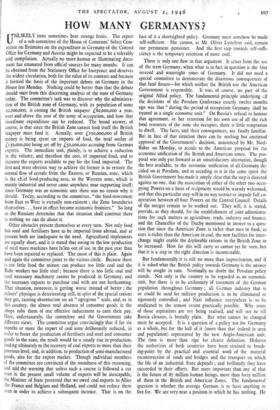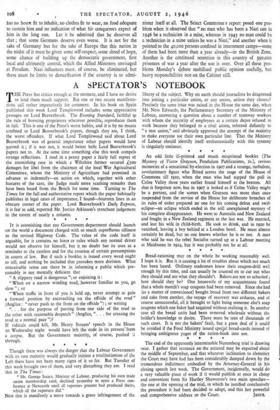HOW MANY GERMANYS ?
UNLIKELY trees sometimes bear strange fruits. The report of a sub-committee of the House of Commons' Select Com- mittee on Estimates on the expenditure in Germany of the Control Office for Germany and Austria might be expected to be a tolerably arid compilation. Actually no more human or illuminating docu- ment has emanated from official sources for many months. It can be obtained from the Stationery Office for fourpence and deserves the widest circulation, both for the value of its contents and because it formed the basis of the important debate on Germany in the House last Monday. Nothing could be better than that the debate should start from this discerning analysis of the state of Germany today. The committee's task was to discover why the administra- tion of the British zone of Germany, with its population of some 22,000,000, is costing the British taxpayer £8o,000,000 a year, over and above the cost of the army of occupation, and how that inordinate expenditure can be reduced. The broad answer, of course, is that since the British Zone cannot feed itself the British taxpayer must feed it. Actually, over £xoo,000,000 of British money is being spent on imports of food, the total outlay of Li3o,000,000 being set off by £5o,o0o,000 accruing from German exports. The immediate task, plainly, is to achieve a reduction in the volume, and therefore the cost, of imported food, and to increase the exports available to pay for the food imported. The first and most obvious way to achieve the former is to restore the normal flow of cereals from the Eastern, or Russian, zone, which is the chief food-producing area, to the Western zone, which is mainly industrial and never came anywhere near supporting itself; since Germany was an economic unit there .was no reason why it should. Today, according to the committee, " the food-movement from East to West is virtually non-existent ; the Zone boundaries themselves .. . have in effect become economic frontiers." So long as the Russians determine that that situation shall continue there is nothing we can do about it.
Other obstacles present themselves at every turn. Not only food but seed and fertilisers have to be imported from abroad, and at present both are inadequate to the need. Agricultural implements are equally short, and it is stated that owing to the low production of steel more machines have fallen out of use in the past year than have been repaired or replaced. The cause of this is plain. Again and again the committee point to the vicious circle. Because there is too little food the miners can produce too little coal and the Ruhr workers too little steel ; because there is too little coal and steel necessary machinery cannot be produced in Germany, and the necessary exports to purchase coal with are not forthcoming. That situation, moreover, is getting worse instead of better ; the miners' physique is deteriorating still, in spite of the special rations they get, causing absenteeism on an " egregious " scale, and, as in this country, the almost total absence of consumer goods in the shops robs them of one effective inducement to earn their pay. Here, unfortunately, the committee and the Government take different views. The committee argue convincingly that if for six months or more the expert of coal were deliberately reduced, in order to foster the production of fertilisers and steel and consumer goods in the zone, the result would be a steady rise in production, leading ultimately to the recovery of coal exports to more than their previous level, and, in addition, to production of semi-manufactured goods, also for the export market Though individual members of the committee are convinced of the soundness of this reasoning, and add the warning that unless such a course is followed a cut even in the present small volume of exports will be inescapable, the Minister of State protested that we owed coal exports to Allies like France and Belgium and Holland, and could not reduce them even in order to achieve a subsequent increase. That is on the face of it a shortsighted policy. Germany must somehow be made self-sufficient. She cannot, as Mr. Oliver Lyttelton said, remain our permanent pensioner. And the first step towards self-suffi- ciency is the temporary retention of more coal.
There is only one flaw in that argument It arises from the use of the term Germany, when what is in fact in question is the four severed and watertight zones of Germany. It did not need a special committee to demonstrate the disastrous consequences of that fatal fissure—for which_ neither the British nor the American Government is responsible. It was, of course, no part of the original Allied policy. The fundamental principle underlying all the decisions of the Potsdam Conference exactly twelve months ago was that " during the period of occupation Germany shall be treated as a single economic unit." On Russia's refusal to honour that agreement, or her retention for her own use of all the rich food resources of the zone she occupies, there is little temptation to dwell. The facts, and their consequences, are fatally familiar. But in face of that situation there can be nothing but unstinted approval of the Government's decision, announced by Mr. Noel- Baker on Monday, to accede to the American proposal for the economic unification of the British and American zones. The pro- posal was only put forward as an unsatisfactory alternative, though the best available, to the economic unification of all Germany de- cided on at Potsdam, and in acceding to it in the same spirit the British Government has made it amply clear that the step is directed against no one, that the association of either of the other two occu- pying Powers on a basis of reciprocity would be warmly welcomed, and that this particular step will in no way restrict or impede full co- operation between all four Powers on the Control Council. Details of the merger remain to be worked out. They will, it is stated, provide, as they should, for the establishment of joint administra- tions for such matters as agriculture, trade, industry and finance, and the Chancellor of the Duchy mentioned in answer to a ques- tion that since the American Zone is richer than ours in food, as ours is richer than the American in coal, the new facilities for inter- change might enable the deplorable rations in the British Zone to be increased. How far this will carry us cannot yet be seen, but that it is a step in the right direction is incontestable.
But fundamentally it is still no more than improvisation, and if it is asked what the British policy towards Germany is the answer will be sought in vain. Nominally no doubt the Potsdam policy stands. Not only is the country to be regarded as an economic unit, but there is to be uniformity of treatment of the German population throughout Germany ; all German industry that is or could be used for military production is to be eliminated or rigorously controlled ; and Nazi influence everywhere is to be eradicated to the utmost extent practically possible. Why some of those aspirations are not being realised, and will not be till Russia chooses, is brutally plain. But what cannot be changed must be accepted. It is a question of a policy not for Germany as a Whole, but for the half of it (more than that indeed in area and population) represented by the new Anglo-American unit. The time is more than ripe for clearer definition. Hitherto the authorities of both countries have been strained to break- ing-point by the practical and essential work of the material reconstruction of roads and bridges and the transport on which the life of an industrial State depends ; and brilliantly they have succeeded in their efforts. But more important than any of that is the future of 67 million human beings, more than forty million of them in the British and American Zones. The fundamental question is whether the average German is to have anything to live for. We are very near a position in which he has nothing. He has no holm fit to inhabit, no clothes fit to wear, no food adequate to sustain him and no indication of what his conquerors expect of him in the long run. Let it be admitted that he deserves all that ; that some Germans deserve even worse. It is not for the sake of Germany but for the sake of Europe that this nation in the midst of it must be given some self-respect, some shred of hope, some chance of building up the democratic government, first local and ultimately central, which the Allied Ministers envisaged at Potsdam. Nazi influences must, of course, be eliminated, but there must be limits to denazification if the. country is to admi- nister itself at all. The Select Committee's report posed one pro- blem when it observed that " no man who has been a Nazi can in 1946 be a technician in a mine, whereas in 1945 no man could be a technician in a mine unleis he was a Nazi," and another when it pointed to the 40,000 persons confined in internment camps—some of them had been more than a year already—in the British Zone. Another is the continued retention in this country of 390,000 prisoners of war a year after the war is over. Over all these pro- blems Monday's cliebate mobilised public opinion usefully, but heavy responsibilities rest on the Cabinet still.



























 Previous page
Previous page